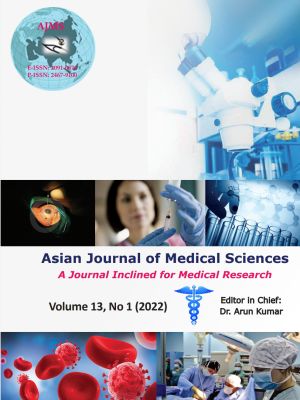Non-descent vaginal hysterectomy surgery associated with less complications and good prognosis
Keywords:
Complications, Hemorrhage, NDVH, Post-operative stayAbstract
Background: Removal of the uterus through vagina when performed in a case without uterine descent or prolapse is known as “non-descent vaginal hysterectomy” or NDVH. Vaginal route is preferred as compared to laparoscopic and abdominal methods. The advantages of vaginal hysterectomy being fewer complications, less post-operative stay, cost effective, and useful in bulky uterus.
Aims and Objectives: The aims of the study were as follows: (1) To study the intraoperative and post-operative complications encountered during NDVH and their management. (2) To assess the intraoperative blood loss, the operative time, and post-operative hospital stay. (3) To study and check the feasibility of vaginal route as the primary route for all hysterectomies in the absence of uterine prolapse.
Materials and Methods: A total of 50 patients were included in the study. Detailed history was taken including obstetric history and menstrual history and clinical examination was performed. After taking written, informed consent and doing proper pre-operative preparation, the patient was posted for NDVH. Post-operative complications were noted. Patients were asked to come for follow-up after 15 days.
Results: In 92% of cases operated, no intraoperative complications were found suggesting low morbidity associated with the procedure. Hemorrhage requiring blood transfusion was found in 4% of cases. Average operative time was 61.2 ± 27.89 min, average blood loss was 170 ± 81.44 ml, and average hospital stay was 5.94 ± 4.95 days. On histopathological examination, 40% were having leiomyoma and dysfunctional uterine bleeding was seen in 22% of cases. Pain was the most common complication seen in 30% of cases while vaginal discharge was seen in just 4% of cases. About 80% of patients were discharged on post-operative day 5.
Conclusion: In 92% of NDVH cases, no intraoperative complications were found suggesting low morbidity associated with the procedure. The post-operative hospital stay was restricted to 5 days in 80% of cases which indicates early discharge of the patient. Post-operative complications such as vaginal discharge and fever were seen only in 4% of cases. NDVH should, therefore, be considered as the primary route for all hysterectomies unless contraindicated in the absence of prolapse.
Downloads
Downloads
Published
How to Cite
Issue
Section
License
Copyright (c) 2021 Asian Journal of Medical Sciences

This work is licensed under a Creative Commons Attribution-NonCommercial 4.0 International License.
Authors who publish with this journal agree to the following terms:
- The journal holds copyright and publishes the work under a Creative Commons CC-BY-NC license that permits use, distribution and reprduction in any medium, provided the original work is properly cited and is not used for commercial purposes. The journal should be recognised as the original publisher of this work.
- Authors are able to enter into separate, additional contractual arrangements for the non-exclusive distribution of the journal's published version of the work (e.g., post it to an institutional repository or publish it in a book), with an acknowledgement of its initial publication in this journal.
- Authors are permitted and encouraged to post their work online (e.g., in institutional repositories or on their website) prior to and during the submission process, as it can lead to productive exchanges, as well as earlier and greater citation of published work (See The Effect of Open Access).




